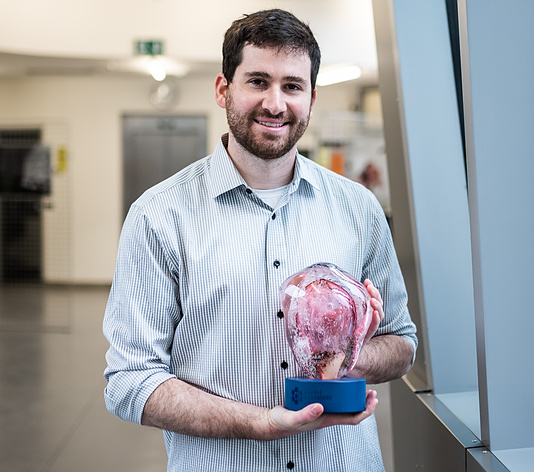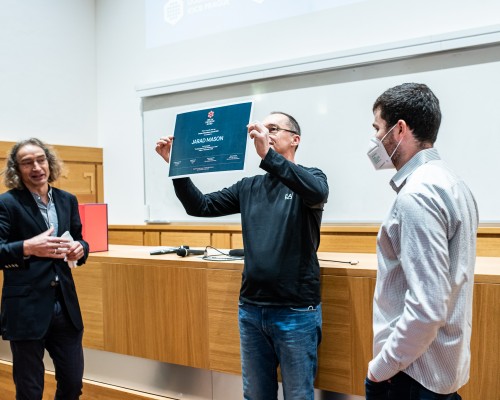Treating hypoxia with microporous water – the 2021 Dream Chemistry Award goes to Jarad Mason of Harvard University
Czas czytania: około 6 minut

The winners of the 2021 Dream Chemistry Award and the TOP 5 Prize have been decided. This year’s Dream Chemistry Award and the financial prize of EUR 10,000 goes to Jarad Mason of Harvard University for his project on treating hypoxia with microporous water. The Scientific Committee also awarded the TOP 5 Prize to Ahmed Badran (Scripps Research), Johannes Bintinger (Linköping University), Luka Đorđević (Northwestern University), Giulio Ragazzon (ISIS, University of Strasbourg), and Ghislaine Vantomme (Eindhoven University of Technology). The Dream Chemistry Award Final took place on December 6 and 7 in Prague (Czech Republic).

The 2021 Dream Chemistry Award goes to Jarad Mason of Harvard University for his project on treating hypoxia with microporous water (Photo: Tomáš Belloň / IOCB Prague)
The Dream Chemistry Award is an international competition like no other – it recognizes young chemists who dream of solving fundamental problems with bold ideas. The competition is organized by the Institute of Organic Chemistry and Biochemistry of the Czech Academy of Sciences and the Institute of Physical Chemistry of the Polish Academy of Sciences.
“It sounds almost cliché, but that’s the reality – it was extremely difficult to choose this year’s winners, because all five finalists presented truly amazing projects,” says competition co-organizer Prof. Pavel Jungwirth of the Institute of Organic Chemistry and Biochemistry of the Czech Academy of Sciences (IOCB Prague). “But we had to make a decision, so after lengthy discussion, the panel selected a project about an innovative treatment for acute oxygen deprivation (hypoxia) using zeolite-based nanoabsorbents, which was presented by Jarad Mason of Harvard. Congratulations to all, particularly to Jarad,” he adds.
The founder of the competition, Prof. Robert Hołyst of the Institute of Physical Chemistry of the Polish Academy of Sciences (IPC PAS), explains the idea behind it: “The Dream Chemistry Award competition was established in 2013, and from the very start, we knew it was a good move. We all dream, and persistent dreamers change the world. Over the last eight years, we’ve witnessed the need for scientific proposals devoid of bureaucratic restrictions imposed by grant systems. After all, every tremendous scientific achievement starts with a dream and a free imagination. We offer this to all young scientists in the Dream Chemistry Award competition.”
Only scientists who have been nominated by senior colleagues and respected experts in their field can compete. Nominees must have a PhD awarded no more than eight years prior and must not be employed by IPC PAS or IOCB Prague. Eligible candidates are then invited to submit their application.
“The applicants are from all over the world. They want to solve problems that touch upon energy storage and production, mysteries of life, sustainable growth in terms of materials usage, and environmental protection. Some aim to introduce technologies that could make the third world a better place to live. In writing their proposals, they further develop their dream ideas. We hope the competition strengthens their will to pursue their scientific dreams for a better world one day,” adds Hołyst.
The 2021 Dream Chemistry Award goes to:
- Dr. Jarad Mason of Harvard University (USA) for his project entitled Treating Hypoxia with Microporous Water. Jarad Mason dreams of storing reversibly high densities of gas molecules in aqueous solutions, even if they are poorly soluble in water. One particular example is the storage of oxygen to prevent hypoxia (oxygen deprivation).
The recipients of the Top 5 Prize are (in the alphabetical order):
- Dr. Ahmed Badran of Scripps Research (USA) for his project entitled Universal Codon Reassignment Using a De Novo Orthogonal Genetic Code. Ahmed Badran would like to expand the function of genetic code and use of artificial amino acids to create new types of proteins with new functions, e.g. enhanced fixation of CO2 for better crop growth.
- Dr. Johannes Bintinger of Linköping University (Sweden) for his project entitled Star Trek SWITCH. Johannes Bintinger dreams of controlling the release of molecules/drugs with single-molecule precision for clear applications in medicine.
- Dr. Luka Đorđević of the Northwestern University (USA) for his project entitled The Dark Side of Photocatalysis. Plants use photosynthesis with visible light to convert CO2 into other chemicals and grow. Luka Đorđević would like to do the same at night by storing electrons in the daytime in proper molecules for later use.
- Dr. Giulio Ragazzon of the Institut de Science et d'Ingénierie Supramoléculaires, University of Strasbourg (France), for his project entitled Endergonic Reactions Enabled by Catalytic Processes. Giulio Ragazzon wants to use driven equilibrium reactions in a similar way to nature (with special dynamic enzymes and energy consumption) to generate products that cannot be obtained through traditional thermodynamic routes – products that can make life better.
- Dr. Ghislaine Vantomme of the Eindhoven University of Technology (Netherlands) for her project entitled Supramolecular Wires for Brain-Inspired Computing. Ghislaine Vantomme dreams of coupling the human brain to interactive materials and, at the far end, of reading thoughts.
The Dream Chemistry Award was established in 2013 by the Institute of Physical Chemistry of the Polish Academy of Sciences (IPC PAS) with the aim of supporting young talents in pursuing their scientific dreams. Since 2017, the contest has been co-organized by the Institute of Organic Chemistry and Biochemistry of the Czech Academy of Sciences (IOCB Prague), with the final alternating between Prague and Warsaw.
Institute of Organic Chemistry and Biochemistry of the Czech Academy of Sciences (IOCB Prague)
IOCB Prague is a leading internationally recognized scientific institution in the Czech Republic. Its primary mission is basic research in the fields of chemical biology and medicinal chemistry, organic and material-oriented chemistry, the chemistry of natural compounds, biochemistry and molecular biology, physical chemistry, theoretical chemistry, and analytical chemistry. The institute has extensive expertise in medicinal chemistry and drug development underpinned by a long tradition of collaboration with the pharma industry. Antivirals discovered at the institute by Antonín Holý and further developed by Gilead Sciences revolutionized the treatment of AIDS and hepatitis B and have significantly improved the lives of millions of people around the globe.
Institute of Physical Chemistry of the Polish Academy of Sciences (IPC PAS)
The institute’s scientific profile is closely tied to the latest global trends in the development of physical chemistry and chemical physics. Scientific research is conducted across 30 research groups, including a bioimaging group, led by ERA chair Prof. Maciej Wojtkowski, and a microfluidics group, led by ERC Starting Grant holder Prof. Piotr Garstecki, together with groups specializing in catalysis, surface science, soft and living matter, biological chemistry, electrochemistry, molecular recognition, sensors, and biosensors. Operating as part of the institute, CHEMIPAN R&D Laboratories implement, produce, and commercialize specialist chemicals for use in the agriculture and pharmaceutical industries.led by ERC Starting Grant holder Prof. Piotr Garstecki, together with groups specializing in catalysis, surface science, soft and living matter, biological chemistry, electrochemistry, molecular recognition, sensors, and biosensors. Operating as part of the institute, CHEMIPAN R&D Laboratories implement, produce, and commercialize specialist chemicals for use in the agriculture and pharmaceutical industries.
- Autor: Dušan Brinzanik
- Materiał graficzny: Tomáš Belloň / IOCB Prague
- Data wpisu: 8.12.2021







